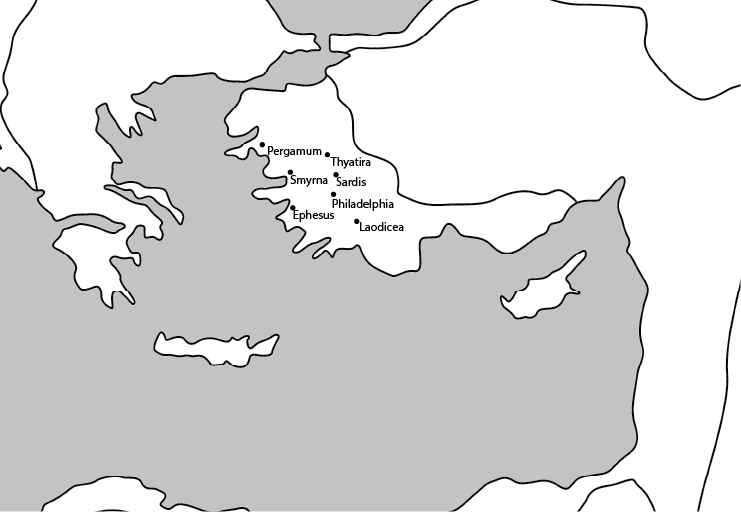| THE SPIRIT TO EPHESUS |
|---|
 |
| 1 To the angel of the assembly in Ephesus write: “He who holds the seven stars in his right hand, he who walks in the midst of the seven golden lampstands says these things: |
| Rev 2:1 The One who has the seven stars in His right hand – the Spirit of Christ as the Ruler of the Angels writes to the Angel of the Church of Ephesus. Does each Church really have its own Angel? Here, we introduce the seven spirits of Yihvah, that are the “eyes of Yihvah” who go throughout the earth. John will introduce seven Angels to the seven Churches. Seven is a complete number, representing all the Angels, and all the Churches of God. Why might each Church receive a different Spirit of God? We generally understand these churches as representing the Churches of Christ throughout history. In the Apostolic time, the spirit of God, the spirit of truth, spoke for Christ (John 16:13). But after the spirit of truth departed from the Church, who spoke for Christ? Did Christ speak to believers directly, or through another spirit? This is one possible explanation for the need for seven Spirits, who would speak to the saints throughout the ages, “test the Spirits whether they are of God…” (1 John 4:1). |
| 2 “I know your works, and your toil and perseverance, and that you can’t tolerate evil men, and have tested those who call themselves apostles, and they are not, and found them false. |
| Rev 2:2 You have put to test those who say they are apostles – we test them by their fruits (Matt 7:16) and by their agreement with the teachings of the Apostles (1 John 4:6). |
| 3 You have perseverance and have endured for my name’s sake, and have not grown weary. |
| Rev 2:3 and you have perseverance – you have withstood and tested those apostles who trouble the Church with another gospel (2 Thess 1:6). |
| 4 But I have this against you, that you left your first love. |
| Rev 2:4 you have left your first love – as Paul said, “having begun in spirit are you now being perfected in the flesh?” (Gal 3:3). The saddest outcome of our faith is to leave the worship of God in spirit. This is the relationship Christ brought us with His Gospel. Of course, God must be our first love,”you shall love the Lord your God, with all your heart, with all your soul, and with all your mind” (Matt 22:37). The way we love God is according to the worship of God in spirit (John 4:24). The spirit of God is God Himself dwelling in us, how could we neglect that relationship? |
| 5 Remember therefore from where you have fallen, and repent and do the first works; or else I am coming to you, and will move your lampstand out of its place, unless you repent. |
| Rev 2:5 do the things you did at first – to love God in prayer, in the holy spirit, and to work as compelled by the love of Christ (2 Cor 5:14); obedient to the Gospel, and zealous for good works. I will remove your lampstand – the Spirit of Christ is the “fuel” for these lampstands; the one who walks among the seven golden lampstands. See also Zech 4:1-2, etc. |
| 6 But this you have, that you hate the works of the Nicolaitans, which I also hate. |
| Rev 2:6 you hate the deeds of the Nicolatians – Irenaeus (180 AD), a hearer of Polycarp, who was a disciple of John, is probably the most reliable source to understand the Nicolatians. In Against Heresies, [Book 1,26,3] Irenaeus wrote: “The Nicolaitanesare the followers of that Nicolas who was one of the seven first ordained to the diaconate by the apostles. They lead lives of unrestrained indulgence. The character of these men is very plainly pointed out in the Apocalypse of John, [when they are represented] as teaching that it is a matter of indifference to practise adultery, and to eat things sacrificed to idols. Wherefore the Word has also spoken of them thus:’ But this you have, that you hate the deeds of the Nicolaitanes, which I also hate.’ “1 (Irenaeus equated the Spirit of Christ with “the Word.” Elsewhere, Irenaeus calls the Pentecostal Spirit – “the spirit of God.” Irenaeus understood the difference between the Spirit of Christ and the spirit of God. This understanding was lost through the creation of the Trinity doctrine.) The Nicolatians did not heed the holy spirit’s warning in Acts 15:20, to keep themselves free from “the pollution of idols” or perhaps more properly the “contamination of false gods.” The exercise of sexual immorality, eating things offered to idols, things strangled and blood were likely all the part of pagan religious rituals. The mixture of paganism and the true religion are an abomination to God. This goes back to Deut 12:29-32. Eventually “the contamination of false gods” would lead the Gentiles away from the worship of God in spirit and back into the observance of religious days. See Gal 4:8-9. |
| 7 He who has an ear, let him hear what the Spirit says to the assemblies. To him who overcomes I will give to eat of the tree of life, which is in the Paradise of my God. |
| Rev 2:7 hear what the Spirit says to the Churches – the Spirit of Christ repeats this phrase to each of seven Churches, so that we clearly understand this is the Spirit of Christ speaking. In discussing verse 6, we quoted from Irenaeus, who equated the Spirit of Christ with the Word of the Old Testament. This is the correct, and pre-Nicene, understanding of the Spirit of Christ as “the Word,” who was “manifest in the flesh” as the man Christ Jesus. |
